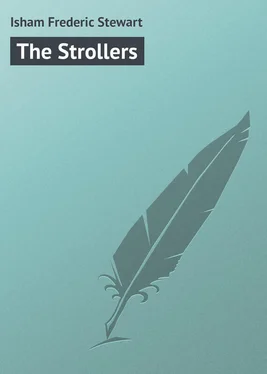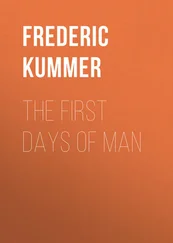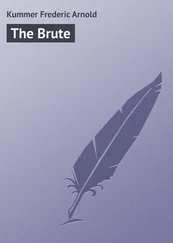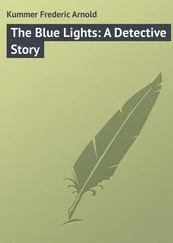Frederic Isham - The Strollers
Здесь есть возможность читать онлайн «Frederic Isham - The Strollers» — ознакомительный отрывок электронной книги совершенно бесплатно, а после прочтения отрывка купить полную версию. В некоторых случаях можно слушать аудио, скачать через торрент в формате fb2 и присутствует краткое содержание. Жанр: foreign_prose, на английском языке. Описание произведения, (предисловие) а так же отзывы посетителей доступны на портале библиотеки ЛибКат.
- Название:The Strollers
- Автор:
- Жанр:
- Год:неизвестен
- ISBN:нет данных
- Рейтинг книги:5 / 5. Голосов: 1
-
Избранное:Добавить в избранное
- Отзывы:
-
Ваша оценка:
- 100
- 1
- 2
- 3
- 4
- 5
The Strollers: краткое содержание, описание и аннотация
Предлагаем к чтению аннотацию, описание, краткое содержание или предисловие (зависит от того, что написал сам автор книги «The Strollers»). Если вы не нашли необходимую информацию о книге — напишите в комментариях, мы постараемся отыскать её.
The Strollers — читать онлайн ознакомительный отрывок
Ниже представлен текст книги, разбитый по страницам. Система сохранения места последней прочитанной страницы, позволяет с удобством читать онлайн бесплатно книгу «The Strollers», без необходимости каждый раз заново искать на чём Вы остановились. Поставьте закладку, и сможете в любой момент перейти на страницу, на которой закончили чтение.
Интервал:
Закладка:
“True, it will be a roundabout way to New Orleans,” continued the manager, disregarding his companion’s response, “but there is no better way of seeing the New World–that is, if you do not disdain the company of strolling players. You gain in knowledge what you lose in time. If you are a philosopher, you can study human nature through the buffoon and the mummer. If you are a naturalist, here are grand forests to contemplate. If you are not a recluse, here is free, though humble, comradeship.”
His listener gazed thoughtfully into the fire. Was the prospect of sharing this gipsy-like life attractive to him? An adventurer himself, was he drawn toward these homeless strollers, for whom the illusions of dramatic art shone with enticing luster in the comparative solitude of the circuit on the wilderness?
As he sat before the glow, the light of the burning shagbark, playing elfishly above the dying embers, outlined the stalwart, yet active figure and the impenetrable, musing features. But when, with an upward shower of sparks, the backlog fell asunder and the waning flame cast yet more gloomy shadows behind them, he leaned back in his heavy, hewn chair and again bent an attentive look upon the loquacious speaker.
“Or, if you desire,” resumed the manager after some hesitation, “it might become a business venture as well as a pleasure jaunt. Here is a sinking ship. Will the salvage warrant helping us into port; that is, New Orleans? There hope tells a flattering tale. The company is well equipped; has a varied repertoire, while Constance”–tenderly–“is a host in herself. If you knew her as I do; had watched her art grow”–his voice trembled–“and to think, sometimes I do not know where the next day’s sustenance may come from! That she”–
He broke off abruptly, gazing at his companion half-apologetically. “We players, sir,” he resumed, “present a jovial front, but”–tapping his breast–“few know what is going on here!”
“Therein,” said the younger man, emptying his pipe, “you have stated a universal truth.” He pushed a smoldering log with his foot toward the remnants of the embers. “Suppose I were so minded to venture”–and he mentioned a modest sum–“in this hazard and we patched up the play together?”
“You don’t mean it?” cried the manager, eagerly. Then he regarded the other suspiciously: “Your proposal is not inspired through sympathy?”
“Why not through the golden prospects you have so eloquently depicted?” replied Saint-Prosper, coldly.
“Why not indeed!” exclaimed the reassured manager. “Success will come; it must come. You have seen Constance but once. She lives in every character to her heart’s core. How does she do it? Who can tell? It’s inborn. A heritage to her!”
His voice sank low with emotion. “Yes,” he murmured, shaking his head thoughtfully, as though another image arose in his mind; “a heritage! a divine heritage!” But soon he looked up. “She’s a brave girl!” he said. “When times were dark, she would always smile encouragingly, and, in the light of her clear eyes, I felt anew the Lord would temper the wind to the shorn lamb.”
“One–two–three–four,” rang the great clock through the silent hall, and, at its harsh clangor, Barnes started.
“Bless my soul, the maids’ll be up and doing and find us here!” he exclaimed. “One last cup! To the success of the temperance drama!”
In a few moments they had parted for their respective chambers and only the landlord was left down-stairs. Now as he came from behind the bar, where he had been apparently dozing and secretly listening through the half-opened door leading into the kitchen, he had much difficulty to restrain his laughter.
“That’s a good one to tell Ezekiel,” he muttered, turning out the lights and sweeping the ashes on the hearth to the back of the grate. “To the temperance drama!”
CHAPTER VI
THE DEPARTURE OF THE CHARIOT
Down the hill, facing the tavern, the shadows of night were slowly withdrawn, ushering in the day of the players’ leaving. A single tree, at the very top, isolated from its sylvan neighbors, was bathed in the warm sunshine, receiving the earliest benediction of day. Down, down, came the dark shade, pursued by the light, until the entire slope of the hill was radiant and the sad colored foliage flaunted in new-born gaiety.
Returning from the stable, where he had been looking after his horse, the soldier stood for a moment before the inn, when a flower fell at his feet, and, glancing over his shoulder, he perceived Susan, who was leaning from her window. The venturesome rose, which had clambered as high as the second story, was gone; plucked, alas, by the wayward hand of a coquette. Saint-Prosper bowed, and stooped for the aspiring but now hapless flower which lay in the dust.
“You have joined the chariot, I hear?” said Susan.
“For the present,” he replied.
“And what parts will you play?” she continued, with smiling inquisitiveness.
“None.”
“What a pity! You would make a handsome lover.” Then she blushed. “Lud! What am I saying? Besides”–maliciously–“I believe you have eyes for some one else. But remember,”–shaking her finger and with a coquettish turn of the head–“I am an actress and therefore vain. I must have the best part in the new piece. Don’t forget that, or I’ll not travel in the same chariot with you.” And Susan disappeared.
“Ah, Kate,” she said, a moment later, “what a fine-looking young man he is!”
“Who?” drawled her sister.
“Mr. Saint-Prosper, of course.”
“He is large enough,” retorted Kate, leisurely.
“Large enough! O, Kate, what a phlegmatic creature you are!”
“Fudge!” said the other as she left the chamber.
Entering the tavern, the soldier was met by the wiry old lady who bobbed into the breakfast room and explained the kind of part that fitted her like a glove, her prejudices being strong against modern plays.
“Give me dramas like ‘Oriana,’ ‘The Rival Queens’ or Webster’s pieces,” she exclaimed, quoting with much fire for her years:
“‘We are only like dead walls or vaulted graves!’”
“And do not forget the ‘heavy’ in your piece!” called out Hawkes across the table. “Something you can dig your teeth in!”
“Nor the ‘juvenile lead,’” chimed in the Celtic Adonis.
“Adonis makes a great hit in a small part,” laughed Kate, appearing at the door. “‘My lord, the carriage is waiting!’”
“My lady, your tongue is too sharp!” exclaimed Adonis, nettled.
“And put in a love scene for Adonis and myself,” she continued, lazily floating into the room. “He is so fond of me, it would not be like acting!”
This bantering was at length interrupted by the appearance of the chariot and the property wagon at the front door, ready for the journey. The rumbling of the vehicles, the resounding hoofs and the resonant voice of the stable boy awakened the young lord of the manor in his chamber above. He stretched himself sleepily, swore and again composed himself for slumber, when the noise of a property trunk, thumping its way down the front stairs a step at a time, galvanized him into life and consciousness.
“Has the world come to an end?” he muttered. “No; I remember; it’s only the players taking their departure!”
But, although he spoke carelessly, the bumping of boxes and slamming and banging of portable goods annoyed him more than he would confess. With the “crazy-quilt”–a patch-work of heptagons of different hues and patterns–around his shoulders, clothing him with all the colors of the rainbow, he sat up in bed, wincing at each concussion.
Читать дальшеИнтервал:
Закладка:
Похожие книги на «The Strollers»
Представляем Вашему вниманию похожие книги на «The Strollers» списком для выбора. Мы отобрали схожую по названию и смыслу литературу в надежде предоставить читателям больше вариантов отыскать новые, интересные, ещё непрочитанные произведения.
Обсуждение, отзывы о книге «The Strollers» и просто собственные мнения читателей. Оставьте ваши комментарии, напишите, что Вы думаете о произведении, его смысле или главных героях. Укажите что конкретно понравилось, а что нет, и почему Вы так считаете.












